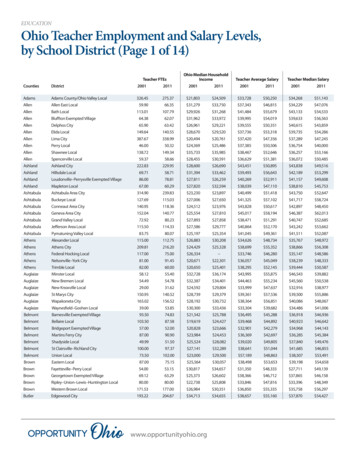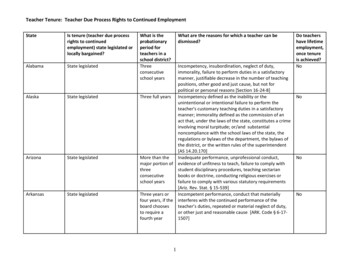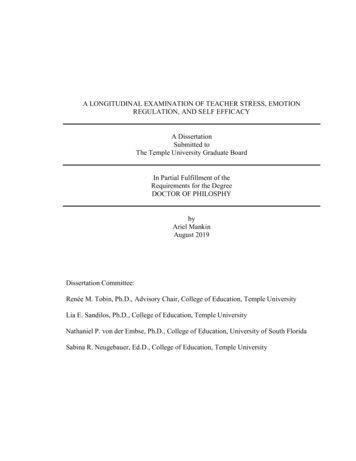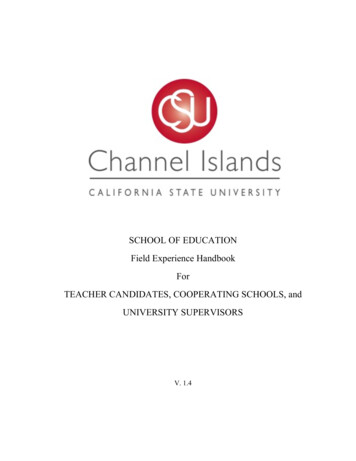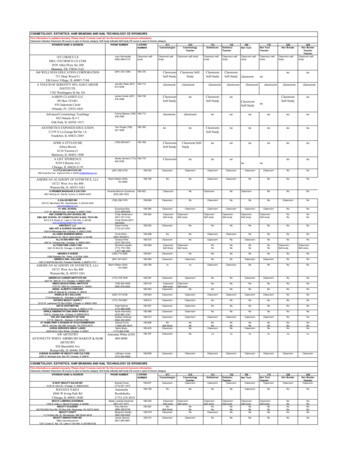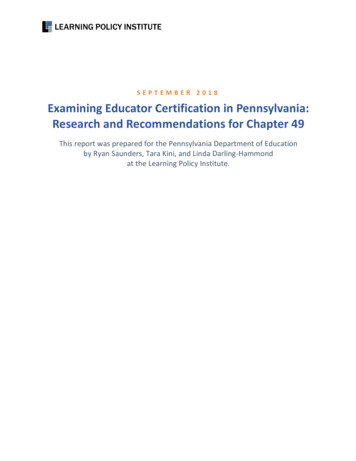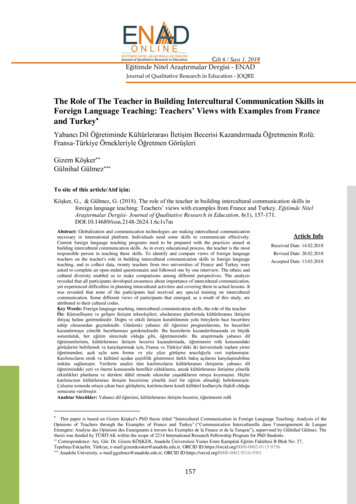
Transcription
Cilt 6 / Sayı 1, 2018Eğitimde Nitel Araştırmalar Dergisi - ENADJournal of Qualitative Research in Education - JOQREThe Role of The Teacher in Building Intercultural Communication Skills inForeign Language Teaching: Teachers’ Views with Examples from Franceand Turkey Yabancı Dil Öğretiminde Kültürlerarası İletişim Becerisi Kazandırmada Öğretmenin Rolü:Fransa-Türkiye Örnekleriyle Öğretmen GörüşleriGizem Köşker Gülnihal Gülmez To site of this article/Atıf için:Köşker, G., & Gülmez, G. (2018). The role of the teacher in building intercultural communication skills inforeign language teaching: Teachers’ views with examples from France and Turkey. Eğitimde NitelAraştırmalar Dergisi- Journal of Qualitative Research in Education, 6(1), ct: Globalization and communication technologies are making intercultural communicationnecessary in international platform. Individuals need some skills to communicate effectively.Current foreign language teaching programs need to be prepared with the practices aimed atbuilding intercultural communication skills. As in every educational process, the teacher is the mostresponsible person in teaching these skills. To identify and compare views of foreign languageteachers on the teacher's role in building intercultural communication skills in foreign languageteaching, and to collect data, twenty teachers from two universities of France and Turkey wereasked to complete an open-ended questionnaire and followed one by one interview. The ethnic andcultural diversity enabled us to make comparisons among different perspectives. The analysisrevealed that all participants developed awareness about importance of intercultural communication,yet experienced difficulties in planning intercultural activities and covering them in actual lessons. Itwas revealed that none of the participants had received any special training on interculturalcommunication. Some different views of participants that emerged, as a result of this study, areattributed to their cultural codes.Key Words: Foreign language teaching, intercultural communication skills, the role of the teacherÖz: Küreselleşme ve gelişen iletişim teknolojileri, uluslararası platformda kültürlerarası iletişimiihtiyaç haline getirmektedir. Doğru ve etkili iletişim kurabilmenin yolu bireylerin bazı becerileresahip olmasından geçmektedir. Günümüz yabancı dil öğretimi programlarının, bu becerilerikazandırmaya yönelik hazırlanması gerekmektedir. Bu becerilerin kazandırılmasında en büyüksorumluluk, her eğitim sürecinde olduğu gibi, öğretmenindir. Bu araştırmada yabancı dilöğretmenlerinin, kültürlerarası iletişim becerisi kazandırmada, öğretmenin rolü konusundakigörüşlerini belirlemek ve karşılaştırmak için, Fransa ve Türkiye’deki iki üniversitede toplam yirmiöğretmenden, açık uçlu soru formu ve yüz yüze görüşme aracılığıyla veri toplanmıştır.Katılımcıların etnik ve kültürel açıdan çeşitlilik göstermesi farklı bakış açılarını karşılaştırabilmeimkânı sağlamıştır. Verilerin analizi tüm katılımcıların kültürlerarası iletişimin yabancı dilöğretimindeki yeri ve önemi konusunda hemfikir olduklarını, ancak kültürlerarası iletişime yöneliketkinlikleri planlama ve derslere dâhil etmede sıkıntılar yaşadıklarını ortaya koymuştur. Hiçbirkatılımcının kültürlerarası iletişim becerisine yönelik özel bir eğitim almadığı belirlenmiştir.Çalışma sonunda ortaya çıkan bazı görüşlerin, katılımcıların kendi kültürel kodlarıyla ilişkili olduğusonucuna varılmıştır.Anahtar Sözcükler: Yabancı dil öğretimi, kültürlerarası iletişim becerisi, öğretmenin rolü Article InfoReceived Date: 14.02.2018Revised Date: 28.02.2018Accepted Date: 13.03.2018This paper is based on Gizem Köşker's PhD thesis titled "Intercultural Communication in Foreign Language Teaching: Analysis of theOpinions of Teachers through the Examples of France and Turkey" (“Communication Interculturelle dans l’enseignement de LangueEtrangère: Analyse des Opinions des Enseignants à travers les Exemples de la France et de la Turquie”), supervised by Gülnihal Gülmez. Thethesis was funded by TÜBİTAK within the scope of 2214 International Research Fellowship Program for PhD Students. Correspondence: Arş. Gör. Dr. Gizem KÖŞKER, Anadolu Üniversitesi Yunus Emre Kampüsü Eğitim Fakültesi B Blok No: 37,Tepebaşı/Eskişehir, Türkiye, e-mail:gizemkosker@anadolu.edu.tr, ORCID ID:https://orcid.org/0000-0002-0115-9756 Anadolu University, e-mail:ggulmez@anadolu.edu.tr, ORCID ID:https://orcid.org/0000-0002-9316-9301157
Volume 6 / Issue 1, 2018Eğitimde Nitel Araştırmalar Dergisi - ENADJournal of Qualitative Research in Education - JOQREIntroductionThe existence of cultural and ethnic diversity dates back to ancient societies in history. Nevertheless,with the effect of globalization, in the era when the capital is rapidly circulating in the economicplatform and information transfer is accelerating day by day via communication technologies,interpersonal and international communication has become a necessity to keep up with the modernworld, and even with everyday life.Interpersonal and international communication occurs especially in linguistic and cultural dimensions(De Carlo, 1998). During communication, people belonging to different languages and cultures interactnot only with each other but also with their language and culture at the same time. In communication,establishing a correct and effective relationship with the other side is made possible primarily byhaving an open view towards differences. Cultural codes play a decisive role in shaping a person’svalues, norms, beliefs and worldview; in other words, their life style. These codes, verbally or nonverbally, come into play spontaneously during communication and affect people’s perception,comprehension and interpretation processes. This is why language, the main culture bearer andtransmitter in verbal communication, is closely related to culture.The key to proper and effective communication is developing a positive and unbiased perspectivetowards all differences by avoiding labelling the individuals belonging to different languages andcultures as "the other". At this point, the aim of intercultural communication is to protect the languageand cultural diversity through the sense of "otherness" (altérité), by promoting the development of thesense of identity and self-awareness in the individual.Diversity is defined as “cultural differences in values, beliefs, and behaviors learned and shared bygroups of interacting people defined by nationality, ethnicity, gender, age, physical characteristics,sexual orientation, economic status, education, profession, religion, organizational affiliation, and anyother grouping that generates identifiable patterns” (Bennett, 2004). In this context, education has anundeniable importance in acquiring intercultural communication skills, which are based on developinguniversal and human values.The School’s Role in Values DevelopmentThe school is “the place where different values and norms are brought together, and where theworldviews and attitude towards the other are originated and shaped” (Abdallah-Pretceille, 2013).The concepts formed in this educational institution have influence on the individual’s thinking,perception and interaction processes through life.It is inadequate to define the school, which has a unifying and integrative mission in society, only asthe place where information is transferred. The school has an important position with its public andprivate structure. In this institution, where the system of ideas and values is established, the concepts of"identity" and "otherness" begin to be shaped both individually and universally (Abdallah-Pretceille,2013).In a multicultural context, contributing to social harmony, this educational institution is alsoresponsible for maintaining unity and integrity while balancing the relationship between students fromdifferent cultures (Carpentier and Riard, 2010).158
Cilt 6 / Sayı 1, 2018Eğitimde Nitel Araştırmalar Dergisi - ENADJournal of Qualitative Research in Education - JOQREThe Teacher’s Role in Foreign Language TeachingTeachers usually have a strategic position in every educational process because of standing at a point inthe classroom where they can build a bridge between the similar and the different, between the insideand the outside, and between the far and the near. In this sense, teachers are responsible for taking allvariables (differences) into consideration during the educational process (Zarate, 1993).The professional competence of a teacher who will work in an educational environment targeted atdeveloping intercultural communication skills requires knowledge on not only linguistics, but alsosocial sciences. For this reason, an education on only literature and linguistics may not be sufficient forthe teacher. This education should also be supported by non-linguistic disciplines such as sociology,psychology, anthropology, etc. (Windmüller, 2011)Another responsibility of the teacher is to protect students from a possible culture shock that can resultfrom the cultural differences in the classroom. Under the guidance of the teacher, the students can learnto listen to their peers respectfully and express themselves appropriately on various topics. Thesepositive attitudes can help the students develop an open perspective over time (Collès, 2013). Theimportant thing in the interaction between students is the teacher’s responsibility of preventing hurtfulor provocative situations on sensitive subjects by maintaining mutual respect within the class or group.Especially in language classes, the teacher has an important role in removing prejudices and buildingup tolerance towards cultural differences. The teacher also needs to enable students to see andrecognize the background of the language and culture being taught. For this reason, first of all, theteacher is expected to be equipped in the field of intercultural communication. In order to be able to dothis, first, the teacher should analyze his or her own language and culture, and then develop aperspective to explore and understand other languages and cultures (Byram, 1992).On the other hand, in the literature, it is also possible to encounter teachers (especially foreignlanguage teachers) who have prejudices arising from the traditional point of view towards differentvalues. In this case, it is important that teachers make a personal effort and develop an independent andobjective approach to have an understanding of the society whose language is being taught(Baumgratz-Gangl, 1993).Action-Oriented ApproachIn the late ‘90s, action-oriented approach emerged and replaced the communicative method. Theprimary feature of this approach is the importance it places upon the cultural dimension in foreignlanguage teaching (Puren, 2006).The approach “views users and learners of a language primarily as ‘social agents’, i.e. members ofsociety who have tasks (not exclusively language-related) to accomplish in a given set ofcircumstances, in a specific environment and within a particular field of action.” (CECR, 2000).To support this approach Girardet (2011) states, “the user of the language is considered as a socialactor who will act in the major areas of social life (personal, educational, professional, public, etc.).For example, attending a wedding means responding to an invitation, making a gift, getting dressedappropriately, and congratulating the married couple.” Girardet reminds that these situationssometimes lead to tasks on a linguistic level such as "congratulating a married couple", "phoning to say159
Volume 6 / Issue 1, 2018Eğitimde Nitel Araştırmalar Dergisi - ENADJournal of Qualitative Research in Education - JOQREthanks for the invitation" or "writing a word to confirm the attendance", and sometimes a task like“finding your place among the tables” on a non-linguistic level.In this context, there are four kinds of knowledge for general and communicative skills that theintercultural approach will provide in foreign language education (CECR, 2000):Knowledge (savoir): Declarative knowledge, knowledge from experience (empiricalknowledge) and from formal education (academic knowledge). All human communication depends ona shared knowledge of the world.Existential competence (savoir-être): The sum of the individual characteristics and attitudeslike self-image and one’s view of others and willingness to engage in social interaction with others.Skills and know-how (savoir-faire): Although this skill may be facilitated by the acquisition of“forgettable” knowledge, it depends more on the ability to carry out procedures than on declarativeknowledge.Ability to learn (savoir-apprendre): It mobilises existential competence, declarative knowledgeand skills, and draws on various types of competence.In the action-oriented approach, where the learners are regarded as social actors, the pragmatic aspectof the language in foreign language teaching and learning comes out. Accordingly, in communicationand social life, the student’s interaction with the target language and culture is to be supported withboth linguistic (verbal expressions) and non-linguistic (behaviors) dimensions.Intercultural CommunicationIntercultural communication is a field of study that aims to preserve the variety of languages andcultures. For this purpose, it focuses on communication and interaction among individuals andsocieties from different cultures. The starting point of this field is multicomponent phenomena such ashuman, society, language and culture; therefore, it encompasses other disciplines like sociology andanthropology.It is necessary to have some qualities in order to communicate correctly and effectively among peoplebelonging to different cultures. By developing these qualities, intercultural communication skillsprovide the ability to establish a healthy and effective communication on the intercultural platform.“The ability to understand the unique aspects of an intercultural interaction, and to generate abehavior that will adapt to this specific situation and allow the given message to be interpreted in thedesired way.” (Bartel-Radic, 2009).There are some factors to be taken into account in an intercultural communication (Windmüller, 2011):-Position and social status of the speakers: relationship style, subject of communication,linguistic choices (rules of politeness, ordinary expressions etc.)-Interactions or word games under the forms of expressions: expressions, connotations etc. thatindicate which group the speaker belongs to in the social context160
Cilt 6 / Sayı 1, 2018Eğitimde Nitel Araştırmalar Dergisi - ENADJournal of Qualitative Research in Education - JOQRE-Elements that accompany oral communication: gestures, mimics, attitudes, posture, distancebetween speakers etc.-Kinesic and proxemic factors: the time and place in which communication takes place.-Dysfunctions stemming from paralinguistic factors: behaviors.All these components in a communication are shaped by social factors. Therefore, every society hasdifferent referents that bear traces of their members. A linguistic sign may be misunderstood ormisinterpreted during communication between people belonging to different cultures, which may leadto disruptions in communication. Intercultural communication skills enable the referents to be madecomprehensible by correcting the errors in communication.Aim of the StudyThe purpose of this study is to identify, examine and compare the views of the foreign languageteachers from two selected universities in Turkey and France on the teacher's role in buildingintercultural communication skills in foreign language teaching. In this regard, the questions to beanswered are as follows:1. What is the role of the teacher in building intercultural communication skills in foreignlanguage teaching?2. What are the similarities and differences between the views of the teachers that participated inthe study from different contexts?The contextual, ethnic and cultural diversity of the teachers sampled from the two different countriesenabled us to reach different perspectives on the subject as a result of the data analysis. Therefore, thisdiversity became effective in reaching some conclusions at the end of the study.MethodResearch DesignThis study was designed as a case study to identify, examine and compare the views of the English andFrench language teachers from two selected universities in France and Turkey on the teacher's role inbuilding intercultural communication skills in foreign language teaching. Because a case study enablesto identify one situation or more and describe them in detail. To be able to get satisfying answers fromthe participants, to properly identify the existing situation, and to describe it in detail, the questionsfocused on were “what is the existing situation?”, “what is happening?”, “how?” and “why?”(Cresswell, 2007).Within this framework, the purpose of this study is not to reach universally valid and generalizableresults, but to examine and describe the participants’ views qualitatively, regardless of the quantitativedimension. In brief, the participants’ personal perspectives on the research questions were the basis ofthis study (Dumez, 2013).161
Volume 6 / Issue 1, 2018Eğitimde Nitel Araştırmalar Dergisi - ENADJournal of Qualitative Research in Education - JOQREInstrumentsAt the first stage, to obtain foreign language teachers’ opinions about intercultural communicationcompetence acquisition in foreign language teaching, a questionnaire composing of open-endedquestions was distributed to the participants. First part of this questionnaire contained questions askingfor personal information such as professional experience, field of study, any education the participanthas had in intercultural communication, etc. The second part included the questions focusing on theintercultural communication competence of the participants. The participants were given a week to fillin the questionnaire. The questionnaires were then collected and the data were analysed. Thereafter,with the reference of the notions obtained by the responses of the questionnaires, semi-structuredindividual interviews were made with the teachers to get their views in detail. The participants wereasked some extra questions according to the interviews’ context, which is one of the advantages ofsemi-structured interview technic. These extra questions provided us to achieve more details. We werealso able to obtain detailed data from the participants having different ethnic and cultural backgroundrelated to their experiences and contexts. It also ensured us to compare the opinions of the participants.ParticipantsIn this study, the data were collected via a questionnaire and face-to-face interviews conducted withtwenty foreign language teachers. The features of the participants are given below:Table 1.Features of the Teachers Participating in the hEnglishProfessionalexperience4 years2 years2 years4 years1 years4 years10 years3 years6 years30 years27 years25 years18 years2 years2 years16 years8 years2 years3 years10 malefemalemalefemalefemalemalefemalemaleThe first group consists of French language teachers who taught students from different countries at thesummer school of Toulouse 2-Jean-Jaurès University Faculty of Foreign Languages, Literatures and162
Cilt 6 / Sayı 1, 2018Eğitimde Nitel Araştırmalar Dergisi - ENADJournal of Qualitative Research in Education - JOQRECivilizations, in France. In this group, all the participants who answered the questionnaire and attendedthe individual semi-structured interviews are French citizens.The second group is made up of English language teachers at the same university in France. Theparticipants who answered the questionnaire and attended the individual semi-structured interviews inthis group are from different nationalities: three of them are French; two of them are American; one ofthem is Canadian; and one of them is German.The participants of the third group are the French language teachers at Eskişehir Anadolu UniversitySchool of Foreign Languages. In this group, all the participants who answered the questionnaire andattended the individual semi-structured interviews are Turkish citizens.The features of the participants are given in the table below. As it is seen, the data were collected froma total of twenty teachers of Turkish (6), French (10), American (2), Canadian (1) and German (1)origins. Among the participants, the most experienced teacher has worked for thirty years, and the leastexperienced teacher has worked for one year.Data AnalysisIn this study, the data were analysed by the content analysis method which provides us to analyse databy coding. The concepts were determined by combining the similar data that came out of the analysis,and the themes and sub-themes were formed with these concepts (Yıldırım and Şimşek, 2005).The flexibility of this method also helped us in data collection process. In the coding process, the datawere analysed, were separated into chunks and then notional categories from each part were obtained.The coding was made by the researcher and two field experts separately. Thereafter, these codes werecompared and the interpretation of the data was made on the common categories determined. It alsoenabled us to check the consistency and reliability of the coders (Cresswell, 2007).After this process was completed, the views of the teachers who participated in the three differentcontexts were examined in their own context and compared within their own group. At the same time,the similarities and differences were identified by the comparisons made among thegroups.Pseudonyms, which were assigned according to sex and nationality of the participants, wereused while reporting the findings.Findings and CommentsAs a result of the data analysis, the views on the teacher’s role in building intercultural communicationskills in foreign language education were combined under four main themes:1. The teacher’s intercultural communication skills2. The teacher’s acquisition of intercultural communication skills3. The teacher’s responsibilities4. Intercultural education163
Volume 6 / Issue 1, 2018Eğitimde Nitel Araştırmalar Dergisi - ENADJournal of Qualitative Research in Education - JOQREHowever, it was found that while sharing similar views on the main themes, the participants sometimeshad differing opinions on the sub-themes.The Teacher’s Intercultural Communication SkillsAcknowledging the necessity of intercultural communication skills for foreign language teachers, theparticipants expressed that the teacher should first internalize basic and universal values in order toacquire this skill. It was concluded that these values are necessary not only for foreign languageteachers, but also for all teachers who take the leading role in education; in fact, for all individuals whowish to adapt to the modern world that is shaped by today’s conditions.Avoiding self-centerednessWithin the framework of the teacher's intercultural communication skills, most of the participantsexpressed that the teacher should primarily have the ability to approach his or her own culture with anobjective and critical perspective. In other words, avoiding positive discrimination against the teacher'sown ethnic background has turned out to be the first step necessary to develop interculturalcommunication skills.(Marion) “The French are incomprehensible. Generally, they have always been bad at languages.Actually, about language, they have more or less the same perception as the English: Their languageis the language of politics. Their language is the global language. Even if this situation is graduallylosing its validity, French is still spoken in some countries like Africa. So, they are not very eager tospeak a different language because, although it is not right, they have this opinion that they can goeverywhere and be understood by speaking French, and that they are not the ones who should adapt,but the others are. It is a shameful thought by the French people on other languages.”The quote above belongs to a French teacher who previously gave foreign language courses in Englandbut is now teaching English language in France. He stated that the experience in a different country(especially where his language is taught) enabled him to look at his own culture from outside and todevelop a critical perspective. Through this example, the teacher emphasized that he did notdiscriminate in favor of the target group of students mostly from his own nation (French) and that hewas far from looking down on other cultures with an ethnocentric view. It turns out that teachers withsuch a perspective have the ability to provide their students, as well, with an objective and criticalperspective that is not self-centered.On the other hand, three teachers (two of them are American and one of them is Canadian) who camefrom different countries to teach English in France and their Turkish colleagues who did teachinginternships in France worked in different contexts, so they had the opportunity to make comparisonsbetween the language teaching processes in France and in their own countries.Attending the study in three different contexts, the participants generally stated that they were againstthe situation in which teachers show a more positive attitude towards the students from the same nationas they are.Being objective and impartial towards cultural differencesAlthough the opinions of the participants about objectivity and impartiality in the classroom aregenerally similar, there are differences in opinion at some points. Some participants (no comparison164
Cilt 6 / Sayı 1, 2018Eğitimde Nitel Araştırmalar Dergisi - ENADJournal of Qualitative Research in Education - JOQREcould be made among the groups because there were teachers who had the same view in each group)stated that they never express their personal views about the sensitive subjects like politics, religionand sexual orientation etc. for they worry about not being able to remain totally impartial. They thinkthat when the teacher shares his or her personal views on a sensitive subject, it can cause disputesamong students. The quote below is taken from the statements of a French participant who teachesFrench language:(Céline) “When I have to do lessons that include controversial topics, my position is to remaincertainly in the background. However, if there are erroneous statements during the discussion, at thatpoint, it is inevitable for me, as a teacher, to step in to say ‘attention, this information is wrong’.Therefore, I correct the information, but not the person.”Some of the participants (no comparison could be made among the groups because there were teacherswho had the same view in each group) stated that everyone is free to express their opinions. Thus, evenif the topics are sensitive, they do not abstain from sharing their own views in the classroom.According to them, the fact that the teacher shares his or her personal views with the class does notmean imposing those views or abusing the students. On the other hand, being a teacher does not meanremaining silent. Teachers, like everyone else, have their own views. If they want to express theseviews, then it is nothing more than an exchange of ideas in the classroom. The important thing here isto avoid imposing views on the students and to create an environment in which they can freely expresstheir own personal opinions while respecting others in the class. The quote below belongs to a Turkishparticipant who teaches French language:(Onur) “The worst thing that a teacher might do to students is to manipulate them instead of leadingthe way and telling them to think and speak the way they want. Then there is obviously a problem here.”Regarding the freedom of expression in the classroom, there were no overlaps between the views andthe groups of the foreign language teachers who participated in the study from three different contexts(French and English language teachers in France, and French language teachers in Turkey). It wasobserved that each group had participants with different views on this topic.The data analysis revealed a variety among the participants’ views about teachers’ sharing theirthoughts on sensitive issues, which can be regarded as taboos, in the classroom. The French teachersgenerally expressed that they avoid sharing their views on sensitive issues in the classroom becausethey find it inappropriate to do so. For them, salary is a taboo subject that should never be talked aboutin the class, even in public. While sharing the same opinion on that point, their American colleagueslisted the subjects they avoid as politics, religion and sexuality.Turkish teachers, on the other hand, were observed to support the freedom of expression on everysubject. Especially, considering that university students are the target group, it was stated that sharingopinions is useful for l
This paper is based on Gizem Köşker's PhD thesis titled "Intercultural Communication in Foreign Language Teaching: Analysis of the . Intercultural communication is a field of study that aims to preserve the variety of languages and cultures. For this purpose, it focuses on communication and interaction among individuals and .



